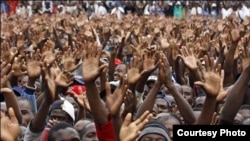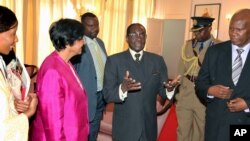HARARE —
Prime Minister Morgan Tsvangirai arrived in the Mozambican capital Maputo Friday afternoon ahead of a summit of the Southern African Development Community (SADC) with the hope that the regional bloc might rein in President Robert Mugabe who unilaterally declared a July 31st election date, a move the premier says violates the country’s constitution.
Mr. Tsvangirai and his delegation arrived in the Mozambican capital hoping SADC will back him in opposing President Mugabe’s decision to hold harmonized elections in Zimbabwe next month.
Mr. Tsvangirai, accompanied by negotiators of his MDC formation, wants SADC to push Mr. Mugabe to implement key democratic reforms before any elections.
President Mugabe left for Maputo on Friday evening.
Tsvangirai’s spokesperson, Luke Tamborinyoka, told Studio 7 by phone from Maputo that the prime minister maintains that the president needed to consult him before proclaiming the election date.
Mr. Tamborinyoka said the MDC will also ask SADC to consider the failure by many Zimbabweans to register to vote in the ongoing voter registration exercise and what a July 31st election date will do to the efforts to get voters registered.
The current voter registration exercise was expected to end on July 9th but under the Electoral Act, registration must close 24 hours before the nomination court sits, but the court sits on June 28th according to President Mugabe’s decree..
Studio 7 was unable to reach officials of the Zimbabwe Electoral Commission to see how they will handle this change to their plans.
But MDC-T organizing secretary Nelson Chamisa says his party believes this will deny many potential voters the chance to participate in the election.
Although many Zimbabweans would like SADC to rein in Mr. Mugabe, University of Zimbabwe law lecturer Lovemore Madhuku says SADC does not have tangible power to do this.
MDC-99 leader Job Sikhala said SADC’s lack of any real authority in this matter means that the Maputo summit will be what he called another talkshow.
Prime Minister Tsvangirai promised Thursday he would go to court to force Mr. Mugabe to abide by the constitution and implement key democratic reforms before polls are called.
But his lawyers, who were expected to file a court application today, said they would file only after the summit. Perhaps they are hoping that SADC action will make a formal court challenge unnecessary.
Mr. Mugabe will likely argue, as he has already done, that he called the election in compliance with an order from the Constitutional Court.
Prime Minister Morgan Tsvangirai and MDC leader Welshman Ncube are expected to argue before regional leaders that they should have had a say on the poll schedule, and that the election date is not possible because there are still critical reforms that must be implemented before any vote, per the global political agreement of 2008.
Ncube MDC secretary general Priscilla Misihairabwi-Mushonga said her MDC will ask SADC to block Mr. Mugabe however they can.
At the same time, Human Rights Watch Southern Africa director, Tiseke Kasambala, says SADC leaders should press Zimbabwe’s unity government for needed reforms before holding elections.
Kasambala says, “SADC should immediately send enough long-term election observers to promote a human rights environment conducive to credible, free and fair elections.”
She says reform of the state security forces is crucial for acceptable elections as security forces have long interfered in Zimbabwe’s political and electoral affairs. “Changes are also needed in the Zimbabwe Electoral Commission, whose secretariat staff has been dominated by state intelligence and military officials”.
In addition, she says, there has been little progress in updating and cleaning up the country’s outdated voters’ roll, which has a significant number of “ghost” voters.
“The unity government has also not undertaken crucial legislative reforms, including the repeal or amendment of laws that inhibit basic freedoms such as the Public Order and Security Act and the Access to Information and Protection of Privacy Act. Further reforms are also needed to the highly partisan state-controlled print and electronic media to ensure that they become genuinely public, to guarantee equal and fair coverage to all political parties,” she says.
Mr. Tsvangirai and his delegation arrived in the Mozambican capital hoping SADC will back him in opposing President Mugabe’s decision to hold harmonized elections in Zimbabwe next month.
Mr. Tsvangirai, accompanied by negotiators of his MDC formation, wants SADC to push Mr. Mugabe to implement key democratic reforms before any elections.
President Mugabe left for Maputo on Friday evening.
Tsvangirai’s spokesperson, Luke Tamborinyoka, told Studio 7 by phone from Maputo that the prime minister maintains that the president needed to consult him before proclaiming the election date.
Mr. Tamborinyoka said the MDC will also ask SADC to consider the failure by many Zimbabweans to register to vote in the ongoing voter registration exercise and what a July 31st election date will do to the efforts to get voters registered.
The current voter registration exercise was expected to end on July 9th but under the Electoral Act, registration must close 24 hours before the nomination court sits, but the court sits on June 28th according to President Mugabe’s decree..
Studio 7 was unable to reach officials of the Zimbabwe Electoral Commission to see how they will handle this change to their plans.
But MDC-T organizing secretary Nelson Chamisa says his party believes this will deny many potential voters the chance to participate in the election.
Although many Zimbabweans would like SADC to rein in Mr. Mugabe, University of Zimbabwe law lecturer Lovemore Madhuku says SADC does not have tangible power to do this.
MDC-99 leader Job Sikhala said SADC’s lack of any real authority in this matter means that the Maputo summit will be what he called another talkshow.
Prime Minister Tsvangirai promised Thursday he would go to court to force Mr. Mugabe to abide by the constitution and implement key democratic reforms before polls are called.
But his lawyers, who were expected to file a court application today, said they would file only after the summit. Perhaps they are hoping that SADC action will make a formal court challenge unnecessary.
Mr. Mugabe will likely argue, as he has already done, that he called the election in compliance with an order from the Constitutional Court.
Prime Minister Morgan Tsvangirai and MDC leader Welshman Ncube are expected to argue before regional leaders that they should have had a say on the poll schedule, and that the election date is not possible because there are still critical reforms that must be implemented before any vote, per the global political agreement of 2008.
Ncube MDC secretary general Priscilla Misihairabwi-Mushonga said her MDC will ask SADC to block Mr. Mugabe however they can.
At the same time, Human Rights Watch Southern Africa director, Tiseke Kasambala, says SADC leaders should press Zimbabwe’s unity government for needed reforms before holding elections.
Kasambala says, “SADC should immediately send enough long-term election observers to promote a human rights environment conducive to credible, free and fair elections.”
She says reform of the state security forces is crucial for acceptable elections as security forces have long interfered in Zimbabwe’s political and electoral affairs. “Changes are also needed in the Zimbabwe Electoral Commission, whose secretariat staff has been dominated by state intelligence and military officials”.
In addition, she says, there has been little progress in updating and cleaning up the country’s outdated voters’ roll, which has a significant number of “ghost” voters.
“The unity government has also not undertaken crucial legislative reforms, including the repeal or amendment of laws that inhibit basic freedoms such as the Public Order and Security Act and the Access to Information and Protection of Privacy Act. Further reforms are also needed to the highly partisan state-controlled print and electronic media to ensure that they become genuinely public, to guarantee equal and fair coverage to all political parties,” she says.






